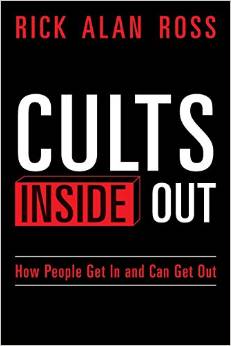
Cults Inside Out: How People Get In and Can Get Out Rick Alan Ross ( CreateSpace Independent Publishing Platform October 16, 2014) Order
How do individuals get involved with cults or abusive controlling relationships in the first place, and what steps can be taken to stage an intervention to rescue them? What can be done to heal those who have been drawn into these damaging situations? These questions and more are addressed in the book Cults Inside Out; How People Get In and Can Get Out, written by a leading expert Rick Alan Ross. Over the course of three decades, Ross has participated in about five hundred interventions, provided expert court testimony, and performed related work all around the world. Within Cults Inside Out Ross describes in detail how to identify and understand a cultic abusive controlling relationship. Ross explains many of the tactics used for control and manipulation-and, more importantly, some of the most effective methods he and other experts have used to reverse unlock undue influence. As a result, readers will find themselves armed with a greater understanding of the nature of destructive cults and abusive controlling relationships. And they will also have an improved ability to assess and deal with such situations-either in their own lives or the lives of friends and family members. Ross describes the intervention process in vivid very defined detail and provides a case examples concerning his intervention approach. One chapter specifically recounts an intervention to rescue a young woman involved in a abusive controlling relationship.
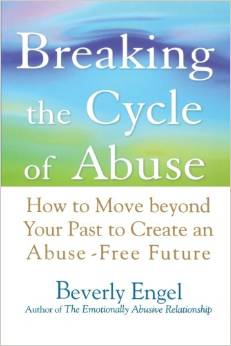
Breaking the Cycle of Abuse: How to Move beyond Your Past to Create an Abuse-Free Future Order
Review — According to Engel, “in the past twenty-five years studies on abuse and family assaults strongly suggest that abused children become abusers themselves,” yet victims often don’t receive any treatment until their repetition of the abuse is already underway. In this clear, empathetic self-help book, Engel aims to stop that cycle by teaching readers to remember the past truthfully, to identify and manage their emotions, and to recognize the characteristics of abusive relationships. An experienced psychotherapist and prolific author (The Emotionally Abused Woman; Loving Him without Losing You, etc.), Engel is also an abuse survivor herself. Her attitude towards her readers is gentle and understanding; she clearly knows firsthand how difficult victim and abuser patterns are to break. Readers are expected to perform a good deal of homework aiming at self-discovery: answering simple questions, writing down their memories, tracing family patterns, etc. Some may argue that Engel presents the most crucial advice—what to do if you’ve already become abusive—too late in volume, by which point an abuser may have dropped the book. But the middle chapters—on shame and its manifestations, on anger, sorrow and fear—are some of the best, especially when Engel delves into the effects of physical, sexual and emotional abuse on children. Though she deals thoroughly with the psychology of victims, Engel concentrates far more than in her earlier books on trying to reach violent and sexual offenders. Violation begets violation, she says. Parental attitudes and behavior, be they cruel, indifferent or supportive, are passed on to later generations. This book is an excellent choice for readers who come from an abusive past and are struggling to make a brighter future for themselves and their families.
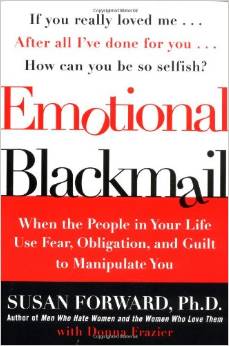
Emotional Blackmail: When the People in Your Life Use Fear, Obligation and Guilt to Manipulate You Order
Forward, who gave us the best-selling The Men Who Hate Women, and the Women Who Love Them, offers a course on self-defense for anyone manipulated by guilt.
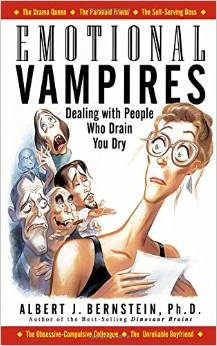
Emotional Vampires: Dealing with People who Drain You Dry Order
Clinical psychologist and business consultant Albert Bernstein’s Emotional Vampires: Dealing with People Who Drain You Dry is a humorous yet serious look at our interactions with people who seem to sap our energy. Through anecdotes, Bernstein makes the various categories of vampires distinctive and recognizable (Anti-Social, Histrionic, Narcissistic, Obssessive-Compulsive and Paranoid) and offers practical guidance for how readers can deal with them effectively (Understanding Emotional Vampires’ immaturity is your ultimate weapon).
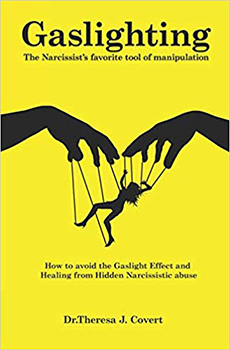
Gaslighting: The Narcissist’s favorite tool of Manipulation – How to avoid the Gaslight Effect and Recovery from Emotional and Narcissistic AbuseOrder
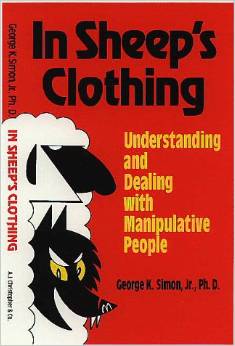
In Sheeps Clothing: Understanding and Dealing with Manipulative People Order
George K. Simon, Jr. received his Ph.D. in clinical psychology from Texas Tech University. He has studied manipulators and their victims for over 10 years and given numerous workshops and seminars on covert- aggressive personalities. Dr. Simon consults to various agencies and institutions and maintains a private practice.
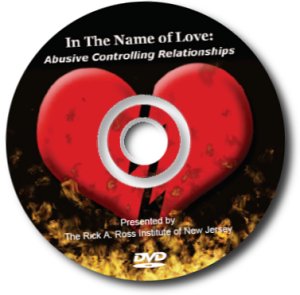
In the Name of Love: Abusive Controlling Relationships (DVD)
Review — “This DVD should be seen by every person entering the dating scene. A superb account of the manipulation, control aspects and red flags of an abuser’s behavior that will enable everyone to spot these predators. This DVD is a magnificent breakthrough–a must-have for every classroom, women’s shelter, and abuse websites everywhere.”
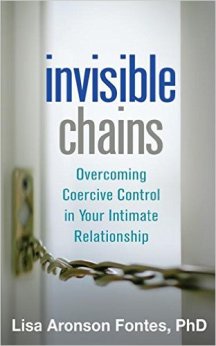
Invisible Chains: Overcoming Coercive Control in Your Intimate Relationship Order
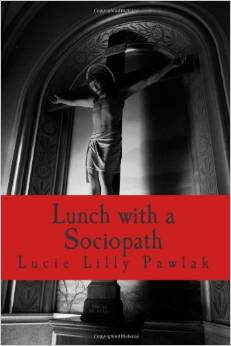
Lunch with a Sociopath Order
This is not the kind of book anyone would enjoy, but it isn’t meant to be. However, Ms. Pawlak is a fantastic writer who is amazingly able to put very difficult feelings and thoughts into words. She is incredibly candid. I read this book in three days because I couldn’t put it down. When I wasn’t reading it, I was thinking about it. I lost sleep over it. This book’s intended purpose is to help those people who are suffering or have suffered spiritual abuse and will fulfill it very well. I also believe that it will help the friends and loved ones of these victims, not because it can tell them how to help, but because it will allow them to see inside the mind and soul of someone who is enduring this kind of trauma and will help them to understand what is happening–it did for me. At some point, if she is able, Ms. Pawlak should look for more opportunities to raise awareness of this problem.
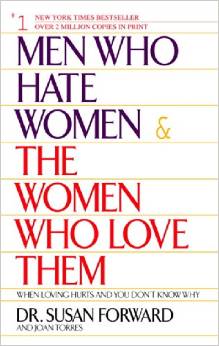
Men Who Hate Women and the Women Who Love Them: When Loving Hurts and You Don’t Know Order
Forward is a therapist, author, and talk-show host whose specialty is abusive relationships. This book grew out of her realization that her own marriage as well as those of many of her clients followed a pattern. Many men need to control their relationships completely and consequently are mentally (if not physically) abusive. They denigrate their partners, resent them if they have any outside interests, and become furious for trivial reasons. Women with low self-esteem are drawn to these men because they can also be charming and devoted. Forward devotes the first half of the book to an analysis of the problem, the second half to breaking the pattern and getting outside help. No bibliography, but competent and interesting, and sure to be popular. Recommended for public libraries. Margaret B. Allen, M.L.S., West Lebanon,



